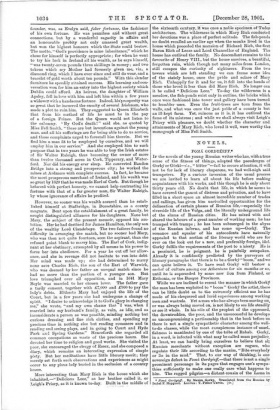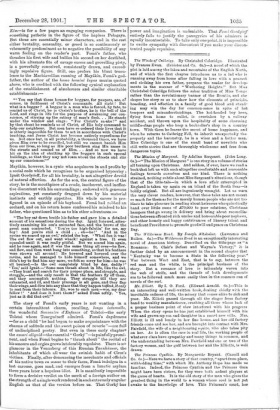NOVELS.
FOMA GORDYEEFF.* IF the novels of the young Russian writer who has, with a true sense of the fitness of things, adopted the pseudonym of
Gorky or GOrki—i.e., "bitter "—fail to secure attention, it will not be for lack of literary chaperons, we had well-nigh said trumpeters. By a curious inversion of the usual process we are invited to learn all about his life before making acquaintance with his works, and this though he is only about thirty years old. No doubt that life, in which he seems to have covered the gamut of distress and privation, and to have filled in a short space an almost incredible number of trades and callings, has given him unrivalled opportunities for the delineation of certain phases of Russian life,—especially the
riverside life of the Volga, and the literally underground life of the slums of Russian cities. He has mixed with and shared the labours of a great number of working men; he has tramped with tramps ; he has been submerged in the abyss of the Russian inferno, and has come up—Gorky. The romance and squalor of his antecedents have naturally appealed to that section of the literary world who are for ever on the look out for a new, and preferably foreign, idol. Gorky fulfils the requirements of the post to a nicety He is a pessimist, he is poignant, he is painfully outspoken. Already it is confidently predicted by the purveyors of literary paragraphs that there is to be a Gorky "boom," and we can quite believe it. To have read Gorky will bestow a cachet of culture among our Athenians for six months or so, until he is superseded by some new lion from Finland, or Esthonia, or the Basque Provinces.
While we are inclined to resent the manner in which Gorky the man has been exploited to "boom" Gorky the artist, there can be little doubt as to the extremely efficient use he has made of his chequered and lurid experiences among working men and wastrels. Yet a man who has always been moving on, or was always being moved on, is not likely to see life steadily or see it whole. In his role of the prophet of the oppressed, the downtrodden, the poor, and the unsuccessful he develops so uncompromising a partisanship that in the book before us there is not a single sympathetic character among the well- to-do classes, while the most conspicuous instance of unsel., fishness is manifested by one of the tribe of Rahab. Gorky, in a word, is infected with what may be called mass prejudice, At least, we can hardly bring ourselves to believe that all Russian merchants without exception are rogues, who regulate their life according to the maxim, "Bite everybody or lie in the mud." That, to our way of thinking, is one sovereign defect in Famci GordOef,—that there is not a single prominent personage in its pages that engages one's sympa- thies sufficiently to make one really care whit happens to him. The ragged pilgrim—a distant cousin of the Lama in • Fowl Gorlyieff. By Maxim Gorky. Tramdated from the Euseinn by Isobel P. Hapwood. London : T. Maher Unwin. PR-] Kim—is for a few pages an engaging companion. There is something pathetic in the figure of the hapless Pelagaya.. But these are essentially minor characters, and in the rest either brutality, sensuality, or greed is so continuously or vehemently predominant as to negative the possibility of any warm feeling on the reader's part. Fome's father, who thrashes his first wife and bullies his second on her deathbed, with his alternate fits of savage excess and grovelling piety,
is a powerfully conceived, consistently drawn, and exceed- ingly repulsive figure. Still, one prefers his blunt trucu-
lence to the Machiavellian cunning of Mayikin, Foings god- father, the author of the homo homini lupus maxim quoted above, who is credited with the following cynical explanation
of the establishment of almshouses and similar charitable establishments :—
"' You say that these houses for beggars, for paupers, are, of course, in fulfilment of Christ's commands. All right ! But what is a beggar ? A beggar is a man who is forced, by fate, to remind us of Christ, he is Christ's brother, he is the bell of the Lord, and rings in life for the purpose of awakening our con- science, of stirring up the satiety of man's flesh. . . He stands under the window and sings : "For Christ's es-she!" and by that chant he reminds us of Christ, of His holy command to help our neighbour. But men have so ordered their lives that it is utterly impossible for them to act in accordance with Christ's teaching. and Jesus Christ has become entirely superfluous for us. Not once but, in all probability, a thousand times, we have given Him over to be crucified, but still we cannot banish Him from our lives, so long as His poor brethren sing His name in the streets and remind us of Him. . . And so now we have hit on the idea of shutting up the beggars in such special buildings, so that they may not roam about the streets and stir up our consciences.' " Maytikin, however, is a cynic who acquiesces in and profits by a social code which he recognises to be organised hypocrisy ; Ignit Gordyeeff, for all his brutality, is not altogether devoid of natural affection. As for the son, the central figure of the story, he is the mouthpiece of a crude, incoherent, and ineffec- tive discontent with his surroundings; endowed with generous aspirations, yet constantly dragged down by his material instincts and earthly appetites. His whole career is pre- figured in an episode of his boyhood. Forel had robbed an orchard, and on his return home confessed his misdeed to his father, who questioned him as to his other adventures :— "The boy sat down beside his father and gave him a detailed account of his sensations during the day. Ignfit listened, atten- tively examining his son's animated face, and the brows of the great man contracted. You're too high-falutin' for me, my boy ! And you're still a child . . . eh—he!" And in the ravine we scared up an owl,' related the boy. What fun it was ! The owl flew out, and went whack ! against a tree. It even squealed until it was really pitiful. But we scared him again, and he rose again, and it was the same thing all over—he flew, and flew, and then went bang into something, so that his feathers were strewn all around ! He hovered and hovered over the ravine, and he managed to hide himself somewhere, and we didn't try to find him any more, we felt so sorry for him—he was all bruised.—Is the owl completely blind by day, daddy ?' 'Yes,' said Ignitt.--.' Some men thrash about in life, like the owl. —They hunt and search for their proper place, and struggle, and struggle,—and the only result is that the feathers fly off them, and they accomplish nothing. They straggle till they are exhausted, and ill, and their plumage is all gone, and they flap their wings, and dive into anyplace that they happen tolfind, if only to rest from their labours. Eh. woe to such men—woe, my dear fellow ! " And does it hurt them?' asked Fora softly. Yes, just as it did that owL' " The story of FomA's early years is not wanting in a certain intermittent charm, recalling, ion go intervallo, the wonderful Souvenirs d'Enfance of Tolstoi—the early Tolstoi whom Tourgueneff admired. Fonni's daydreams —for as a child "he had begun to make acquaintance with the charms of solitude and the sweet poison of reverie "—are full of undisciplined poetry. But even in these early chapters the amari alignicl—the essential" Gorky "—is painfully promi- nent, and when Point/ begins to "thrash about" the recital of his amours and orgies grows intolerably repulsive.. There is ns glamour in the Venusberg of this Russian Tannhituser, the inhabitants of which all wear the swinish habit of Circe's victims. Finally, after denouncing the merchants and officials of his native town en masse to their faces, Fount indulges in a. last carouse, goes mad, and emerges from a lunatic asylum three years later a hopeless idiot. It is manifestly impossible to forma decisive verdict on the merit of a foreign author on the strength of a single work rendered in such extremely angular English as that of the version before us. That Gorkj has power and imagination is undeniable. That Fowl Gordy4eff entirely fails to justify the panegyrics of his admirers is equally incontestable. To take only one point, it is impossible to exeite sympathy with discontent if you make your discon- tented people repulsive.



































 Previous page
Previous page